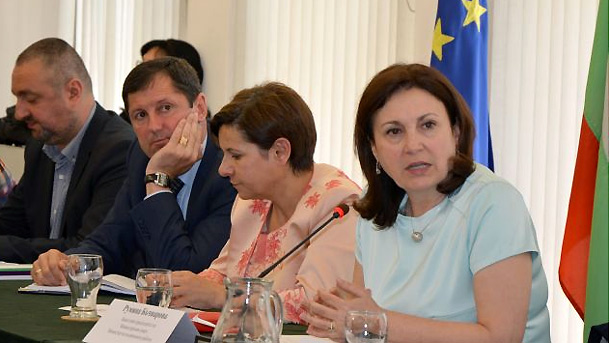
The Center for the Study of Democracy presented the results of the test application of the system for monitoring of anti-corruption policies at the Chief Directorate Border Police at the Ministry of Interior. The trend regarding the fight against corruption since 1989 is very controversial. The process was not put entirely under control and no permanent decline of corrupt practices has been registered. 20% of the Bulgarians aged 18 or above say that they paid bribes or were subject to pressure, the analysis reads. Bulgaria is at the bottom of the EU ranking regarding corruption-free societies, far behind the Scandinavian countries, where there is almost no corruption. It is even behind countries such as Italy and Greece, where corruption is at medium level.
The main purpose of the new instrument is to measure the efficiency of anti-corruption measures and show any possible gaps during the application of the current set of measures. The evaluation is based on interviews under 5 criteria: corruption interest, corruption pressure, applicability, application and efficiency of the anticorruption policy. The work of the Border Police is very important to us. The situation there has been changing as a result of the new management measures, Bulgaria’s Deputy Premier and Minister of Interior Rumiana Bachvarova said. In her words, one of the main deficits in the system regarded the fact that corruption was measured under standard criteria which provided a general picture of the situation, but did not accentuate on the details. It would be a very good decision to apply the general and the specific measures in this system, Minister Bachvarova underlined and added:
“The instrument has another advantage as well. It provides opportunity to the competent authorities to evaluate the effect of the anticorruption measures and policies and formulate the policies which accentuate on the details. Apparently, they are much more effective than all visible indicators. The anti-corruption policies must follow the dynamics of the surrounding environment. Corruption practices always outstrip the anticorruption measures. That is why prevention and early steps are of such great importance to the fight against corruption. We must apply systematically this measure, in order to follow the dynamics of the indicators and be aware of our progress in every single moment. ”
The new system is more special, because it is used by public institutions. It identifies the problems and the anti-corruption policies, Director of the Scientific Research Department at the Center for the Study of Democracy Dr. Alexander Stoyanov told Radio Bulgaria. What did the latest results show?
“Mostactivitiesareexposedtosignificantrisk. Different people are trying to get round the law and offer various benefits to the employees”, Mr. Stoyanov explains. “We developed specific measures for some specific activities such as the work of the border check points. However, the information about their efficiency shows that sometimes there lacks strict control and some of the people who violate the rules remain unpunished. In other words, this measure has to be applied more strictly. However, there are other types of activities where corruption risk is higher due to the lack of such measures. The riskiest activities at the Border Police Chief Directorate regard the public procurement orders and the administrative activity. There is always a risk of corruption in the public procurement field, because it is always linked to money spending and we have to pay special attention to this sphere, in order to reduce corrupt practices there. We also applied the new method abroad - at the health service in the town of Trento (Northern Italy) and the municipality of Riva Del Garda, a small Italian town with a population of nearly 15,000 people. The corruption pressure in Italy is twice lower as compared to the one in Bulgaria. The Italian citizens are more critical towards their behavior and the anti-corruption measures. They are more sincere. However, according to a law adopted in Italy in 2014, each public institution must have an employee in charge of the fight against corruption and the development of anticorruption measures, i.e. Italy marked bigger progress in this sphere”, Alexander Stoyanov concludes.
English version: Kostadin Atanasov
At the end of last week, we witnessed the third consecutive failed vote of no confidence against the government of Prime Minister Rosen Zhelyazkov. This time, the motion was initiated by Vazrazhdane (Revival), the third largest parliamentary political..
The draft report on the progress of North Macedonia on its path to European integration has been a hot Balkan topic in recent weeks, after rapporteur Thomas Weitz included in the document concepts such as "Macedonian identity" and..
The European Commission has given a positive assessment of Bulgaria’s amended Recovery and Resilience Plan (RRP). According to BNR correspondent in Brussels Angelina Piskova, the document includes a special chapter dedicated to attaining independence..
Movement for Rights and Freedoms - New Beginning Leader Delyan Peevski spoke with Prime Minister Rosen Zhelyazkov on Monday, the party's press centre..

+359 2 9336 661
